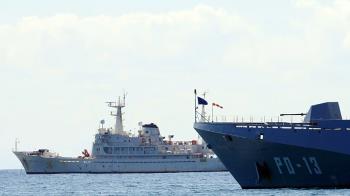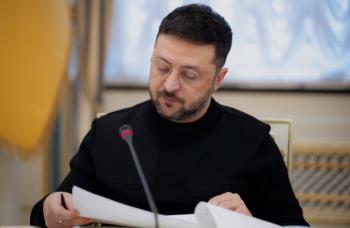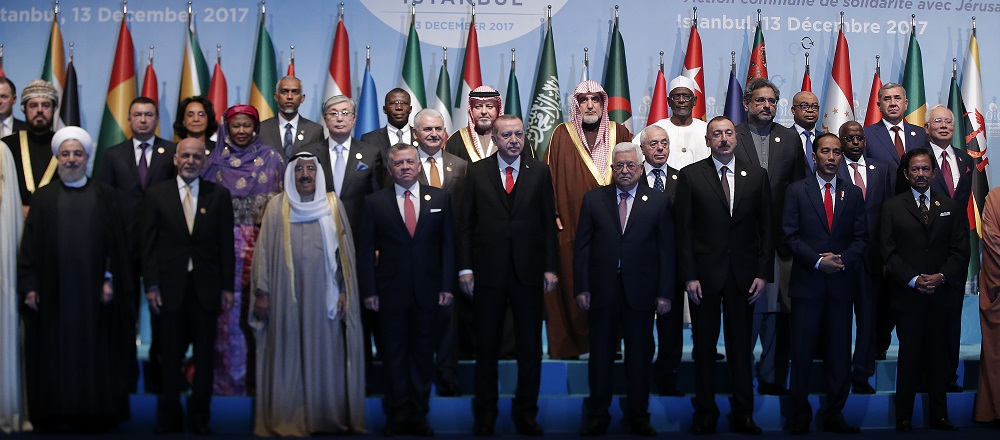Alwaght- When the American President Donald Trump made the controversial decision to recognize al-Quds (Jerusalem) as the capital of the Israeli regime and move the American embassy to the contested city, the Muslim world responded in a variety of ways. One of the most important reactions was holding the emergency meeting of the Organization of the Islamic Cooperation in Istanbul on Wednesday at the suggestion of Turkey. The move was meant to give the Muslim leaders a chance to come together, discuss the challenge, and come out with a unified stance on the American leader’s move. The session was significant because it could set off the alarm bells saying that lack of a common strategy among the Muslim states in this time of necessity for hard decisions can bear deleterious consequences to the Muslim and Arab countries alike, with the capability to seriously transform the geopolitical order of the West Asia region.
At the present time, exploitation of the huge potentials of the OIC can harmonize the stances of the Islamic world’s leaders and lead to a closely-coordinated response to this provocative measure.
OIC potentials
The OIC is the second largest international organization after the United Nations. 57 countries with a total population of about 1.5 billion from over four continents are members of the Islamic body. The shared religious identity is the main point bringing the Muslim countries under the umbrella of the OIC, which renamed from the Organization of the Islamic Conference in 2011. In the late 1960s, the Muslim nations came up with the notion that division is the main weak spot of the Muslim world in the confrontation of the various threats, among them the emergence of the Israeli regime after Palestine occupation. The leaders agreed that the only way of getting rid of weakness was the Islamic unity, a conclusion that came out with the foundation of the Organization of the Islamic Conference in 1969. A massive organization with a large number of members, the OIC holds great soft and hard potentials. If the member states cultivate a strong will to play an active and serious role in the Palestinian case, they bear the ability to turn the tide.
Military potentials
As the leader of the Ansarallah Movement of Yemen Abdul-Malik Badreddin al-Houthi put it a couple of days ago, one of the main bases of the foundation of the Islamic Military Coalition is the motivation to liberate the land of Palestine. In past decades, except for Iran and Syria, the Muslim and Arab countries declined to support the arming of the Palestinian and Lebanese movements that are spearheading a camp to check the Israeli violations. Some of the supporters of the Palestinian cause themselves have been grappling with internal crises in past few years. Syria is the top example, a pro-resistance player which has been fighting a set of foreign-backed terrorist groups at home in the past seven years. Despite lack of the convenient support, the 33-day Israeli-Hezbollah war in 2006 and the 22-day Israel-Hamas war in 2009 proved that armed potentials are viable.
Political and cultural potentials
As part of an efficient unified response to the Trump al-Quds recognition, the Muslim countries can cut off diplomatic ties with Tel Aviv and Washington. They can put pressures on the Israelis and Americans at the international organizations using their votes. Media work is another area where the Muslims can leave a great impact. They should launch a campaign of uncovering the reality about the anti-Palestinian oppression, as well as the real nature of the US and its allies’ agendas and measure, especially those of the Israeli regime.
Economic potentials
The economy is where the Muslims can make a difference, too. Huge oil and gas and other natural resources beside a huge population offer the OIC states unmatched might which, once exploited via a dynamic of consensus, cannot be pushed back by any opponent force. Even the simple step of boycotting the American and Israeli products can deal a painful blow to the two belligerent sides.
Key Obstacles
Although the OIC carries important capabilities to defend the rights of the Palestinians, it since its foundation has chosen to remain passive in relation to the case. The issue can be subjected to a focus from various aspects:
Without any doubt, the superior role of Saudi Arabia in the OIC is one of the main causes of the inefficacy of the organization. Riyadh role, as some analysts put it, has ended up crippling the OIC. The kingdom is one of the key founders of the OIC. The permanent secretariat of the OIC is located in Jeddah, Saudi Arabia. However, when it comes to deviation of the OIC from its main agenda, the Saudis take the center stage. The reason majorly derives from the closeness of the Saudi policy and goals to that of the Israeli regime and the US. This is also evident in terms of the trio’s interests when it comes to the recent years’ Muslim world crises. The process of cooperation of Riyadh with Washington and Tel Aviv saw major intensification after assumption of power in Saudi Arabia by Salman bin Abdulaziz and his son Mohammad bin Salman.
Saudi Arabia holds sway in such significant Arab states as the UAE, Jordan, Morocco, and others like the small members of the Arab League. These states are heavily dependent on the Saudi Arabian financial aids. So, they do not raise their voice of protest against the Saudi OIC policies, despite their inner will to do so. While nearly all of the Muslim countries participated in the extraordinary session on al-Quds on Wednesday in Turkey with their highest-ranking officials, the leaders of Saudi Arabia, the UAE, and Bahrain rejected to attend and instead sent their foreign minister-headed delegations to Istanbul.
When it comes to serving the Israeli interests, these three countries spare no efforts, but on such vital Muslim world’s cases, including the Palestinian cause, they not only show chilly approach but also take steps towards distracting the Arab and Muslim world’s public opinion from concentration on the Palestinians’ plight. A top trick of them to this end is to paint Iran as the top regional threat. This plan, mainly designed and applied by such Arab and American figures as bin Salman, Trump’s senior advisor Jared Kushner, Crown Prince of Abu Dhabi Mohammed bin Zayed Al Nahyan, and some others, intends to sideline the al-Quds cause as a top Muslim nations’ priority. With unceasing Saudi struggles, what once stood basis to the formation of the OIC is now a more political than religious case on the organization’s agenda.
Another reason behind the deficiency of the OIC in addressing the al-Quds case is the American influence in some OIC members. Some of the members are hosting the American military bases, and hence are receiving military and security support from Washington. This is enough for them to take into consideration the American interests and they are unlikely to step out of the line in such regional and international organizations as the Arab League, (Persian) Gulf Cooperation Council, and the OIC.



























